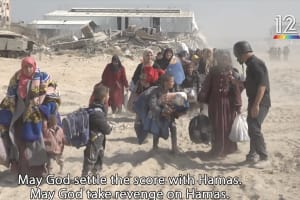IDF prevents Hezbollah suspects from damaging Israel’s northern border fence
Attempted incursion takes place on 17th anniversary of 2006 Second Lebanon War

A group of Lebanese suspects affiliated with the Hezbollah terror group attempted to damage Israel’s northern frontier border fence near the town of Zar’it on Wednesday afternoon.
The Israel Defense Forces published a video showing the suspects approaching and touching the fence before a small explosion went off at the site.
According to Israeli military sources, a non-lethal explosive charge was placed there to prevent people from attempting to breach it.
OPERATIONAL FOOTAGE: Multiple suspects approached the northern security fence with #Lebanon in a sabotage attempt.
— Israel Defense Forces (@IDF) July 12, 2023
We operated to distance them from the fence. pic.twitter.com/Q5j7ELuvXk
Three members of the Hezbollah group were reportedly “lightly” wounded in the incident, which took place on the 17-year anniversary of the 2006 Second Lebanon War between Israel and the Lebanese terror group.
Before departing on an official diplomatic visit to Azerbaijan, Israeli Defense Minister Yoav Gallant said the IDF “deterred Hezbollah activists with non-lethal means and will continue to guard the security of the State of Israel.”
“Anyone who tests us will get a response,” he added.
During a protest several hours later, Hezbollah activists set fires and began to launch fireworks near the northern Israeli town of Metula, causing several old landmines in the area to explode.
Israeli forces fired warning shots in response to the Hezbollah activists, according to both local Israeli and Lebanese reporters.
“The IDF will continue to prevent any attempt to violate Israeli sovereignty and damage to the northern security fence,” the military said in a statement.
Tensions have been high in recent weeks with Hezbollah activity along the internationally recognized border (the Blue Line). In early June, two tents manned by Hezbollah members were discovered in the Mount Dov region, also known as Shebaa Farms. One tent was removed after Israel reportedly threatened an armed confrontation if it was not removed soon.
The Mount Dov region was captured by Israel from Syria in the Six-Day War in 1967, and later annexed along with the Golan Heights. The Lebanese government says the area belongs to Lebanon.
An anti-tank missile was fired last week at the contested village of Ghajar resulting in no injuries.
According to an Army Radio report, dozens of Lebanese soldiers along with Hezbollah members crossed into Israeli territory without passing the border fence itself, before heading back.
Last month, Hezbollah claimed it shot down an Israeli drone flying over a southern Lebanese village.
The Blue Line or boundary between Israel and Lebanon is marked with blue barrels and lies several meters from the Israeli fence in some areas and is built entirely within Israeli territory.
Ghajar, the only Alawite Muslim-majority settlement in Israel, was also part of the territory captured from Syria in 1967 and was effectively annexed by Israel in 1981 together with the Golan Heights.
In 2000, following the Israeli withdrawal from Lebanon and the demarcation of the Blue Line, the village was split in two, with the northern half coming officially under Lebanese control. Israel regained control over the entire village during the Second Lebanon War in 2006, and residents have since objected to the potential division of the village and annexation of its northern half to Lebanon.
The town remained a closed military zone for more than two decades, with special permission required for any nonresidents seeking to enter or exit the area. In September, area restrictions were lifted when a barrier north of the village was constructed to block the entrance from Lebanon.
The Iranian-backed Hezbollah terror group has long been the IDF’s most potent adversary on Israel’s borders, with an estimated arsenal of nearly 150,000 rockets and missiles that can reach anywhere in Israel.

The All Israel News Staff is a team of journalists in Israel.













